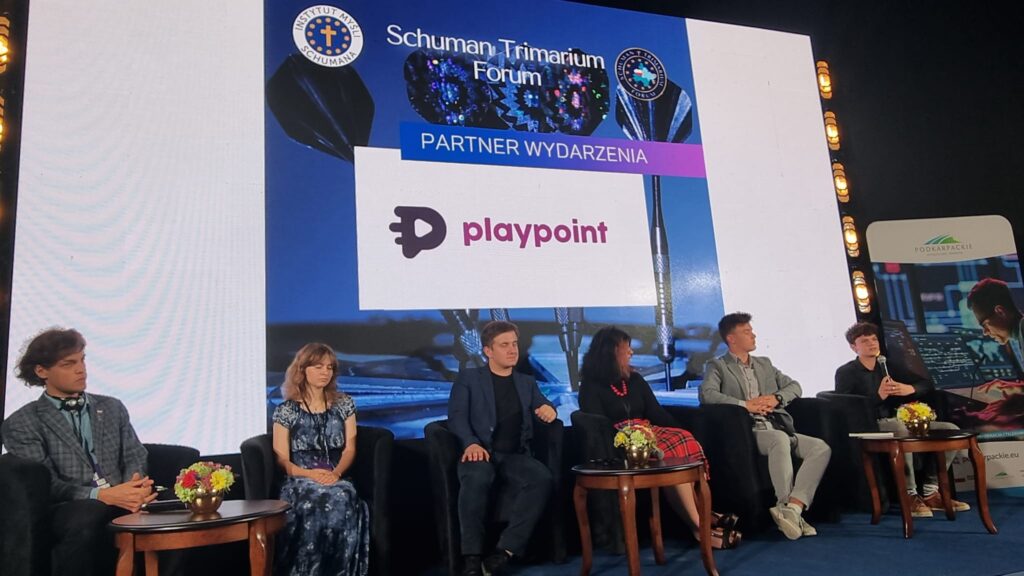
“Christianity is the key to the integration of the Three Seas” – wrote the Speaker of the Sejm, Elżbieta Witek, in a special letter to the participants of the Schuman Trimarium Forum organized by the Institute of Schuman’s Thought. She emphasized that the young generation of Europeans today faces a difficult task of creating a model of cooperation in relation to Robert Schuman’s concept, which was once the basis of the European Union. 150 young people from 10 countries gathered in Krasiczyn to debate current problems and the future of Intermarium in the beautiful surroundings of the castle interior. The fruit of the first day of debates was the idea of creating student Schumann circles at universities in Intermarium, which was favorably received by the Ministry of Education and Science, represented by Minister Wojciech Murdzek.
“The young generation of Europeans today faces a difficult task of creating a model of cooperation in relation to Robert Schuman’s concept, which was once the basis of the European Union, according to which Europe is not a single superstate, but appears as a community of nations based on Christian values, freedom, solidarity, diversity and patriotism” – Elżbieta Witek wrote, sending a letter with a special message to the young participants of the Schuman Trimarium Forum.
“Belonging to a Christian culture obliges us to build a European community in the spirit of mutual respect, without hidden leadership motives or selfish exploitation of other countries. In this context, Christianity is the key to the integration of the Three Seas. Another condition for achieving unity is European policy implemented in accordance with patriotic ideals. According to Schuman, only true love for one’s homeland allows one to maintain diversity” – she added.
The Marshal of the Sejm pointed out that “Poland, as the largest country in the Three Seas region, today plays an extremely important role in building dialogue between all countries.”
The Minister of Foreign Affairs, Prof. Zbigniew Rau also addressed his words to the audience, in a way continuing the thought of Elżbieta Witek. “Robert Schuman, patron of your Institute, said that nothing that is lasting is achieved easily. Europe is on the way” – he said, emphasizing that “however, beyond institutions, the roots of the idea of community and its spirit of solidarity as a community are crucial”.
The need for freedom of scientific debate
Participants of the Schuman Trimarium Forum drew attention to the need for freedom of scientific debate. “Universities are supposed to be a space radiating freedom of scientific debate, freedom that seeks the truth” – Prof. Zbigniew Krysiak, chairman of the Program Council of the Institute of Schuman’s Thought said. “A doctor is someone who asks questions and from these questions come solutions and applications. This has a very practical dimension. A politician should also be a doctor who, when proposing something, asks himself whether it should actually be implemented in this way or not. should be corrected” – he noted.
The economist pointed out that in some countries we are dealing with a situation where the freedom of scientific debate is blocked. “Without freedom of scientific debate, there is no progress, there will be no possibility of finding the truth” – he noted.
He pointed to the need to create student Schuman circles at universities in the Intermarium. “They can be created within the universities that are in this coalition, which was initiated by Minister Czarnek” – he proposed, referring to the coalition of 13 Three Seas universities. He drew attention to the need to train young people in the spirit and methods of Robert Schuman. “We should really support this idea” – Minister Murdzek commented on this proposal. “In Poland, we started a project to support science clubs at the ministry level and we already have three editions. It’s really working fantastically. Young people, receiving additional funds, improve the quality of their work and cooperation” – he shared his experience so far.
In turn, prof. Tomasz Grosse pointed out that neo-Marxism, which is another destructive ideology coming to us from the West, poses a huge threat to the freedom of university debate. “All plagues were invented in Western Europe, which are very traumatic for the whole of Europe and the whole world” – he emphasized. “Today we live in a world where a certain neo-Marxist ideology, sometimes defined as genderism, is flowing from the West again and this is another plague, a poison that wants to take away our freedom and wants to poison the pursuit of truth at universities. That is why we, in Eastern Europe, we focus on our own identity to defend ourselves against it, otherwise this next plague, this next poison will destroy us” – he said.
In addition to science, the topics of discussion on the first day of the Schuman Trimarium Forum included economic issues and the Polish potential of digital technologies. In the youth debate, the participants of the Schuman Trimarium Forum emphasized that for the young generation, the priority is no longer money, but specific values and agency in implementing them. They indicated that having an influence on reality was the most important thing. They emphasized that young people provide a fresh perspective, which, combined with the experience of older people, gives very good results in the development of all areas of life.
The Schuman Trimarium Forum, organized by the Institute of Schuman’s Thought together with strategic partners (including the Podkarpackie Voivodeship and the Industrial Development Agency), will last until September 22. The event was held under the patronage of the Speaker of the Sejm, Elżbieta Witek.
Anna Wiejak
